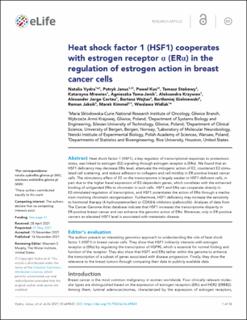Heat shock factor 1 (Hsf1) cooperates with estrogen receptor α (erα) in the regulation of estrogen action in breast cancer cells
Vydra, Natalia; Janus, Patryk; Kuś, Paweł; Stokowy, Tomasz; Mrowiec, Katarzyna; Toma-Jonik, Agnieszka; Krzywon, Aleksandra; Cortez, Alexander Jorge; Wojtaś, Bartosz; Gielniewski, Bartłomiej; Jaksik, Roman; Kimmel, Marek; Widłak, Wiesława
Journal article, Peer reviewed
Published version

Åpne
Permanent lenke
https://hdl.handle.net/11250/2991672Utgivelsesdato
2021Metadata
Vis full innførselSamlinger
- Department of Clinical Science [2318]
- Registrations from Cristin [9791]
Sammendrag
Heat shock factor 1 (HSF1), a key regulator of transcriptional responses to proteotoxic stress, was linked to estrogen (E2) signaling through estrogen receptor α (ERα). We found that an HSF1 deficiency may decrease ERα level, attenuate the mitogenic action of E2, counteract E2-stimulated cell scattering, and reduce adhesion to collagens and cell motility in ER-positive breast cancer cells. The stimulatory effect of E2 on the transcriptome is largely weaker in HSF1-deficient cells, in part due to the higher basal expression of E2-dependent genes, which correlates with the enhanced binding of unliganded ERα to chromatin in such cells. HSF1 and ERα can cooperate directly in E2-stimulated regulation of transcription, and HSF1 potentiates the action of ERα through a mechanism involving chromatin reorganization. Furthermore, HSF1 deficiency may increase the sensitivity to hormonal therapy (4-hydroxytamoxifen) or CDK4/6 inhibitors (palbociclib). Analyses of data from The Cancer Genome Atlas database indicate that HSF1 increases the transcriptome disparity in ER-positive breast cancer and can enhance the genomic action of ERα. Moreover, only in ER-positive cancers an elevated HSF1 level is associated with metastatic disease.
